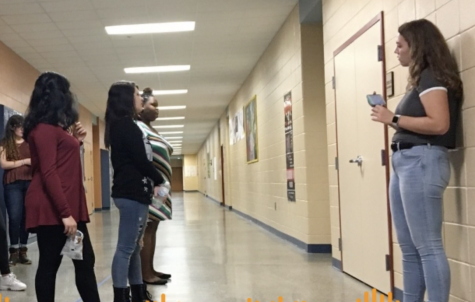Mercer University’s Robert McDuffie Center for Strings adapts to virtual lessons and performances
One of Mercer’s most acclaimed programs, the Robert McDuffie Center for Strings, faces a unique challenge completing this semester.
Senior violin performance major Evan Hjort said the three main pillars of how the McDuffie Center structures its coursework are solo work, chamber music or small ensembles of 3-6 people, and orchestra. Several instructors, including many visiting faculty members, teach classes, which gives the McDuffie Center an unusually comparable ratio of students to faculty.
“At a normal conservatory you would just go to work with a single teacher,” Hjort said. “There would be different studios of different teachers of the same instrument, but you’d work with one teacher exclusively. At the center, we work with all faculty of our instrument…throughout my time there, I had three teachers simultaneously, which I think really contributes to your maturity as a musician. You can get input from multiple points of view.”
The McDuffie Center attracts students from across the country and internationally. This special institution within Mercer’s Townsend School of Music consists of 26 total students at a time, and all these students receive a full tuition scholarship, according to the McDuffie Center’s official website.
It’s a competitive, performance-based environment.
Hjort said he’s been pleased with how his professors have transitioned to virtual coursework in what is normally a very hands-on environment.
“The faculty has done a pretty remarkable job of adapting curriculums that did depend so much on in-person interaction,” Hjort said. “They’ve been really flexible when it comes to timing.”
Still, with lessons and performances now completed over Zoom, he said the sound quality hasn’t been ideal. It’s more difficult to pick up on specific nuances, which is mostly what these advanced musicians need from their instructors.
Solo lessons have been relatively easy to schedule and complete, but chamber and orchestra sessions have been more difficult, Hjort said.
“Obviously, you can’t really play with someone in a different place,” he said. “Just the lag time and the audio quality wouldn’t be worth it.”
He said his teachers have adapted the group-based curriculum to be more analytical during this time. The groups still meet virtually with their coaches, but the classes are more research-based. They work on research and presentations about the pieces they were previously assigned, and also listen as a group to this music and discuss the artistic and logistical aspects of performing the repertoire that they were originally supposed to play.
Plus, with McDuffie students hailing from several different states and countries, the wide range of time zones has been a challenge. Hjort is from Washington, so his three-hour time difference from Macon, Georgia, means a lot of early mornings.
Hjort also teaches violin online to his own students, which he said makes him more comfortable in a virtual learning environment.
“I’m much more used to the medium in general,” he said.
Even though Hjort is familiar with online learning, virtual classes still make for a strange last semester as a Mercer University student.
He remembers visiting Macon and the McDuffie Center for the first time during his college tours.
“I was just really struck by the uniqueness of the model of the center,” he said. “There really isn’t another music school at such a high level that is so small.”
The program’s size allowed the group to become tight-knit. For years, he’s spent several hours every day with the same group of people, and they grew incredibly close. Since only a couple of the McDuffie students are originally from the American Southeast, he said it’s been hard knowing there won’t be a logistically simple reunion. Everyone is scattered across the world.
“Many of these people, I will be lucky if I get to see them again,” Hjort said.
There was no conclusive farewell, either. McDuffie students trickled back to their homes as shutdowns increased, and at the time, no one was completely certain whether this would be their last time seeing each other at Mercer or not. Hjort said the lack of ceremony—literally and figuratively—was understandable, but hard to reckon with.
He still sees his classmates, albeit virtually, as they finish up the last of their coursework in their different corners of the world.













